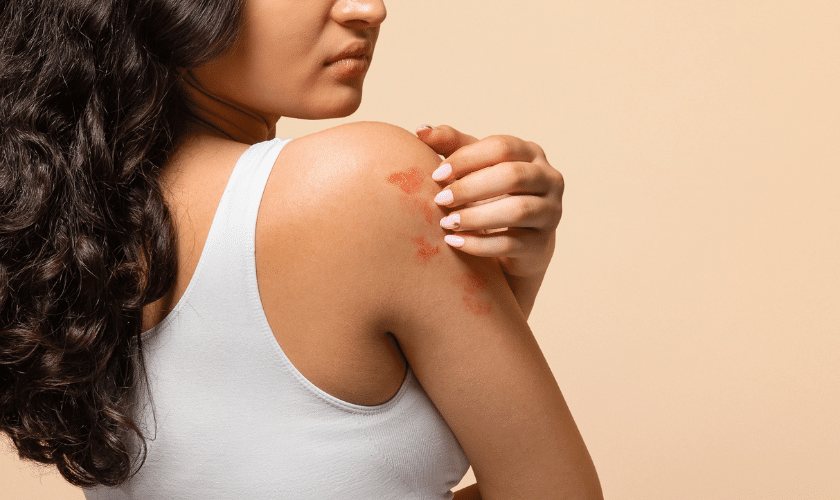Dealing with skin allergies can be challenging, especially when you’re unsure about what’s causing the irritation. Knowing the common skin allergens and how to avoid them can make a significant difference in maintaining healthy skin. This guide will help you identify potential culprits and offer practical tips to keep your skin safe.
Fragrances: A Sneaky Irritant
Fragrances are found in many personal care products, from lotions and shampoos to deodorants and cosmetics. While they can make products smell pleasant, they are a common cause of skin allergies.
Tips to Avoid Fragrances:
- Opt for fragrance-free or hypoallergenic products.
- Check ingredient lists for terms like “parfum” or “fragrance”.
- Choose products labeled “unscented” carefully, as they may still contain masking scents.
Preservatives: Necessary but Troublesome
Preservatives extend the shelf life of skincare products, but they can also trigger allergic reactions. Common preservatives include parabens, formaldehyde releasers, and methylisothiazolinone (MI).
Tips to Avoid Preservatives:
- Look for products that contain natural preservatives like vitamin E or rosemary extract.
- Conduct a patch test on a small skin area before applying new products.
- Consider using preservative-free products, particularly for sensitive areas.
Nickel: Ubiquitous and Unavoidable?
Nickel is present in many everyday items, including jewelry, belt buckles, and even some electronic devices. Prolonged contact can lead to nickel allergy, characterized by redness, itching, and swelling.
Tips to Avoid Nickel:
- Wear jewelry made of stainless steel, titanium, or gold.
- Apply a protective barrier cream before wearing nickel-containing items.
- Use clear nail polish on the back of belt buckles or other metal items to reduce direct skin contact.
Latex: The Rubber Culprit
Latex, found in gloves, balloons, and various medical supplies, can cause serious allergic reactions in some individuals. Symptoms can vary from mild skin irritation to severe anaphylactic reactions.
Tips to Avoid Latex:
- Choose latex-free gloves and other products.
- Inform medical professionals of your latex allergy before procedures.
- Read labels on household items to ensure they are latex-free.
Plants: Nature’s Hidden Hazards
Plants like poison ivy, poison oak, and poison sumac contain oils that can cause allergic reactions. Even touching contaminated clothing can trigger a reaction.
Tips to Avoid Plant Allergies:
- Learn to identify and avoid toxic plants in your area.
- Wear long sleeves and pants while hiking or gardening.
- Wash skin and clothing immediately after potential exposure.
Hair Dyes: Beauty with a Risk
Many hair dyes contain para-phenylenediamine (PPD), a potent allergen. Reactions can range from mild itching to severe dermatitis.
Tips to Avoid Hair Dye Allergies:
- Before using a new hair dye, conduct a patch test.
- Use PPD-free hair dyes or natural alternatives like henna.
- Seek professional help for hair coloring to minimize risk.
Soaps and Detergents: Clean but Harmful
Soaps, detergents, and fabric softeners often contain harsh chemicals that can irritate the skin. Ingredients like sodium lauryl sulfate (SLS) are common culprits.
Tips to Avoid Irritating Soaps and Detergents:
- Use mild, fragrance-free, and hypoallergenic detergents.
- Opt for soap-free cleansers for sensitive skin.
- Rinse clothes thoroughly to remove detergent residues.
Synthetic Fabrics: Comfort vs. Reaction
Certain synthetic fabrics like polyester, nylon, and spandex can cause allergic reactions. The dyes and chemicals used in manufacturing these fabrics can also be problematic.
Tips to Avoid Synthetic Fabric Allergies:
- Wear natural fibers like cotton, linen, and silk.
- Wash new clothes before wearing them to remove chemical residues.
- Avoid tight-fitting synthetic clothing that can cause friction and irritation.
Skincare Products: A Mixed Bag
Many skincare products, even those marketed for sensitive skin, can contain allergens. Ingredients like lanolin, essential oils, and alcohol can cause reactions.
Tips to Avoid Allergenic Skincare Products:
- Read ingredient labels carefully.
- Patch test new products before regular use.
- Choose products specifically formulated for sensitive skin.
Metals in Cosmetics: Beauty in Disguise
Cosmetics often contain metals like cobalt and chromium, which can cause contact dermatitis. These metals are used in pigments for eye shadows, blushes, and lipsticks.
Tips to Avoid Metal Allergies in Cosmetics:
- Select products labeled as hypoallergenic.
- Avoid metallic and glittery makeup.
- Perform a patch test with new makeup products.
Tips for Managing Skin Allergies
Managing skin allergies involves a combination of avoiding known allergens and treating symptoms. Here are few general tips to help:
- Identify Triggers: Keep a diary of products and activities to pinpoint what causes reactions.
- Consult a Dermatologist: A professional can conduct patch tests to identify specific allergens.
- Use Protective Barriers: Gloves, clothing, and creams can help shield your skin from allergens.
- Keep Skin Hydrated: Moisturized skin is less likely to become irritated.
- Treat Reactions Promptly: Use over-the-counter antihistamines and hydrocortisone creams to manage mild reactions. In case of severe reactions, seek medical assistance promptly.
Skin allergens can be frustrating, but with a little vigilance and care, you can minimize their impact on your life. By knowing what to avoid and how to manage your skin’s health, you can enjoy clearer, more comfortable skin. Remember, if you suspect you have a skin allergy or need personalized advice, consulting with a dermatologist is always a wise decision. They can offer tailored recommendations and treatments to manage your skin condition effectively.

